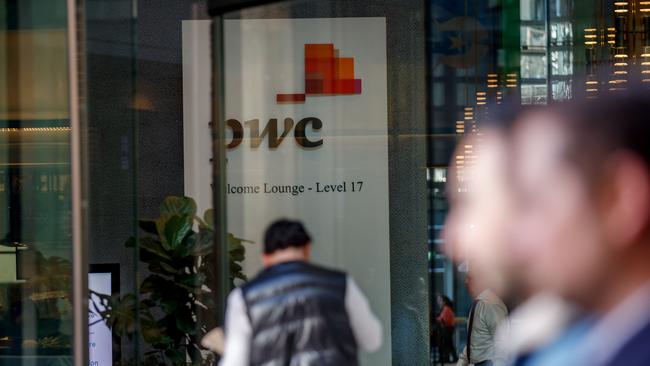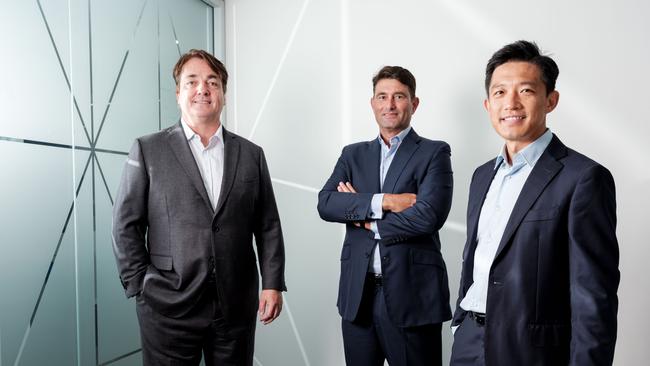Former PwC Australia consulting arm Scyne posts $81m loss after Allegro Funds bargain buy
Buying PwC’s old consulting arm for ‘$1’ was a dollar too much according to the latest financials for Scyne. New records reveal the deal’s true cost was millions more and it has posted an $81m loss as professional services demand crumbles.

Every way you cut it, Allegro Funds’s bet on rehabilitating the consulting arm of PwC Australia, which it purchased for a headline figure of $1 and renamed Scyne Advisory, has been a dud.
The private equity firm snapped up the consulting division in the wake of revelations PwC shared confidential government tax policy with potential corporate clients looking to reduce their Australian Taxation Office bills.
The rivers of cash flowing from Canberra’s coffers to Scyne, and Scyne’s former PwC talent, have been diverted to other consulting firms.
Data analysed by The Australian shows that Scyne’s deal flow from federal government contracts - where the vast majority of its revenue used to come from - is only a quarter of what that same division earned when it was still badged PwC.
Scyne’s chief executive John Ball conceded consulting was “a really tough market at the moment”, in an interview with The Australian. “For consulting, it is a hard time.”
Still, despite the slump in available work, he expects the firm to be trading profitably on an earnings before interest and tax measure in July. “What we have seen in the last couple of months is some positive momentum.”
Rivals question how the firm that has just fired 10 per cent of its workforce and is failing to win major Federal or NSW state government contracts could manage this. Scyne is now down to 75 partners from 100, and down to 1000 staff from 1200, at inception.
How much did Allegro pay for Scyne?
Allegro’s $1 deal doesn’t pass the audit test, either.
Documents Scyne was required to produce for the securities regulator reveal that Allegro actually paid $16m, reduced to $14.3m after other considerations. The regulatory documents also refer to a “bargain purchase of $6m”. “Bargain” in this context means it paid below the accounting value of the assets.
Critically, it then tipped $90m of cash into the newly separated company to get it running.
These figures contradict the humble $1 origin story of Scyne given PwC stood to receive up to $16m. And the marquee dealmakers who remain - after many jumped ship - face enormous pressures to turn it around.
The audited filings show Scyne made a pre-tax loss of $81m for the period ended June 30, 2024.
Certainly, fees to the Big Four, being PwC, KPMG, EY and Deloitte are down from their peak, but new names have stepped up to pick up the slack.
Data from AusTender indicates consulting spend peaked under the Morrison government at $680m in the year to May 2020. The next highest was the year to May 2024, with the Albanese government spending just over $660m on consultants, of which EY, KPMG and Deloitte were the first, second and third largest beneficiaries, and the emerging Nous Group filling the hole once occupied by PwC and now Scyne.

Who are the consultants behind Nous?
The little-known Nous has 62 “principals” according to its website, with more than two-thirds having previously worked for the government. Its sudden successes on major federal government contracts appears to be replicated in NSW where LoveMeTender data shows its lead over its nearest rival in the health space, Deloitte, is close to double.
Nous’s former public servant workforce, which also has a strong representation of academics, is no longer under the radar.
Earlier this week, independent senator David Pocock accused the Australian National University of “misleading” the Senate after it was revealed a Nous contract said to be worth $50,000 was actually worth $800,000, according to the ABC.
Nous chief executive Tim Orton says even with its recent successes, it’s a “difficult market” for his firm too, because of the “very unpredictable” level of demand from clients.
“It continues to be the most competitive market that we have seen in our 25 years,” says Orton.
As it should be. What the last few years have underlined in the electorate’s mind is that federal and state governments have been playing an expenditure juggling game, cutting public servant roles to meet budget requirements but hiring more expensive consultants, usually from the Big Four, to do the work instead.
And then there’s tax leaks.
Orton says the blowback from this is being reflected in “less demand overall” for consultants, though his firm is now winning a bigger piece of the pie.
“Our clients recognise that purchasing well in a competitive consulting market will provide a quality of services that will deliver better outcomes for government,” Orton says.
PM’s vow to cut consultant spend
The Albanese government said in election campaigning that it would cut spending to consultants, although it refused to break out its own figures for its existing spend or detail how big the cuts would be.
Orton says he can’t yet predict if or how these would flow through.
“It is very early to make judgements about the directions of the re-elected Albanese government,” says Orton. “Our sense is that the Prime Minister has signalled a continued commitment to his longer-term agenda, which has removed some uncertainties that we were considering during the campaign. The government is also ramping up efforts to find savings in expenditure on contractors and consultants.”
Finding clear figures on what the government is currently spending on consultants is difficult.
For instance, in the year to May 2024, AusTender reports EY, KPMG and Deloitte received Commonwealth consulting contracts totalling $145m, but wider analysis shows most income reported in other categories with total fees to taxpayers exceeded $470m in that year. And even this is not the full picture, with NBN Co, Western Sydney Airport, ARTC and others not required to report consulting spend on AusTender at all.
The issue of secrecy around procurement came up repeatedly in the two senate and two NSW state inquiries.
But it’s unlikely that Scyne’s objective of being profitable by July is hiding in undiscoverable government contracts.
Deloitte, EY and KPMG earned an average of $211 million per firm per annum in the last two years, while Scyne has averaged $46 million per year, or about one fifth of the work Canberra gave to the remaining Big Four firms.

Public for purpose clients
Ball, who has now been at Scyne for six months, says it’s starting to win work in “different” ways to that of the old PwC team.
“We have a very different route to market and a very different capability set and a very different offering,” says Ball. “We’re very much about building capabilities in the agencies, where we do a lot of skill transfer work, that was never the case of the Big Four, and we invest in the clients, in that sort of capability building, and they really like that, and they see the difference.”
When quizzed on where to find data on contracts that Scyne is winning, Ball said much of it was “public for purpose,” which is a phrase to describe working for corporate clients that work for the “betterment of Australians” in spaces such as private hospitals, healthcare and energy.
That public for purpose motto is a shift from its start-up mindset of being an “independent government-specialist company”.
More current financial information beyond June 30, 2024 is not available, and Ball would not comment on the financial filings that appeared to indicate the firm was leveraged 2.56 times.
Nor would Scyne’s owner Allegro, which only volunteered that Scyne demonstrated “strong resilience.”
“Performance continues to strengthen month-on-month, reinforcing profitability and operational momentum,” says an Allegro spokesman. “As long-term backers of Scyne’s strategic vision, we’re excited by the compelling opportunities ahead and remain committed to supporting its next phase of growth.”
When asked whether his “public for purpose” models might include examples such as working for the likes of Brookfield, which is the second biggest hospital owner in Australia, Ball drew a blank.
“I’m not sure what Brookfield is,” the former Google and Microsoft exec said of the Canadian asset management giant. “You have public hospitals, private hospitals, we will actually work on both because there is a public purpose, and they’re delivering great outcomes for Australians.”
If there is some comfort Scyne staff can draw from the changes afoot under Ball, it’s that the firm has just decided to make all staff equity holders in Scyne.
The spoils of consulting will be shared, if Scyne can win them back.





